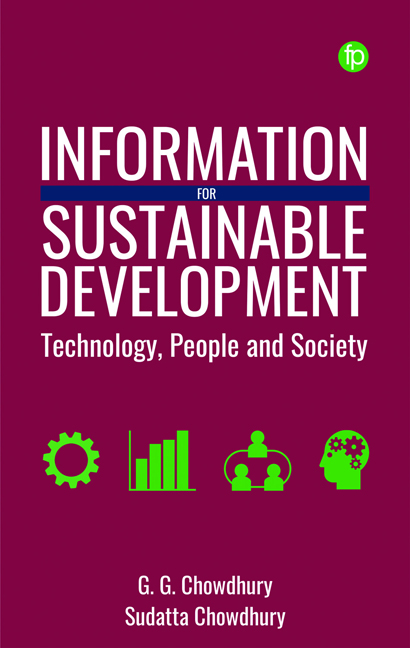Book contents
- Frontmatter
- Dedication
- Contents
- Figures
- Tables
- About the Authors
- Introduction
- 1 Data, Information, People and Society
- 2 Information and the Sustainable Development Goals
- 3 Sustainable Development Goals: Targets and Indicators
- 4 Data, Information and Progress in SDGs
- 5 Capacity, Co-operation and Sharing of Data for SDGs
- 6 People and the SDGs: the Digital Divide
- 7 People and the SDGs: Access to Data and Digital Skills
- 8 Information Skills and the SDGs in Everyday Life
- 9 Information, Education and Sustainable Development
- 10 Research and Development Around the SDGs
- 11 Information Education, Research and Professional Developments Around SDGs
- References
- Index
9 - Information, Education and Sustainable Development
Published online by Cambridge University Press: 13 April 2024
- Frontmatter
- Dedication
- Contents
- Figures
- Tables
- About the Authors
- Introduction
- 1 Data, Information, People and Society
- 2 Information and the Sustainable Development Goals
- 3 Sustainable Development Goals: Targets and Indicators
- 4 Data, Information and Progress in SDGs
- 5 Capacity, Co-operation and Sharing of Data for SDGs
- 6 People and the SDGs: the Digital Divide
- 7 People and the SDGs: Access to Data and Digital Skills
- 8 Information Skills and the SDGs in Everyday Life
- 9 Information, Education and Sustainable Development
- 10 Research and Development Around the SDGs
- 11 Information Education, Research and Professional Developments Around SDGs
- References
- Index
Summary
Introduction
Education can play an important role – directly or indirectly – in advancing the achievement of each of the 17 SDGs. UNESCO argues that sustainable development for all countries is only truly possible through comprehensive cross-sector efforts that begin with education. SDG4 (Education) specifically sets a Target, education for sustainable development in all different contexts of life, living and society, in the following terms:
SDG4.7: By 2030, ensure that all learners acquire the knowledge and skills needed to promote sustainable development, including, among others, through education for sustainable development and sustainable lifestyles, human rights, gender equality, promotion of a culture of peace and non-violence, global citizenship and appreciation of cultural diversity and of culture's contribution to sustainable development.
(UN Department of Economic and Social Affairs, n.d.b)Education for sustainable development can be divided into two broad categories: (1) education and training of people who are engaged in collecting, processing, managing and making use of data and information related to the SDGs; and (2) education of students, academics, researchers, policymakers and members of the general public about sustainable development in all areas of life and a sustainable world. Several international agencies, such as the United Nations Statistics Division, and national agencies, like the UK Office for National Statistics (ONS), aim to build multinational collaborations to develop training programmes and pathways for the education of people who are engaged in collecting, processing and making use of data and information for measuring achievements in different SDGs, Targets and the relevant Indicators. Similarly, international agencies like UNESCO and national bodies, especially the government departments of education in different countries, are working to develop specific programmes and pathways for educating students at all levels about the role and importance of the SDGs in different areas of learning and living. Side by side, libraries, being a primary social institution for promoting education and supporting lifelong learning, and various international library associations, like IFLA (International Association of Library Associations and Institutions) and national library associations like CILIP: the Library and Information Association in the UK, ALA (the American Library Association) and so on have introduced different strategies and initiatives for developing awareness and training programmes for promoting education around the SDGs in general, and the sustainability and climate change agenda in particular.
- Type
- Chapter
- Information
- Information for Sustainable DevelopmentTechnology, People and Society, pp. 157 - 176Publisher: FacetPrint publication year: 2024

